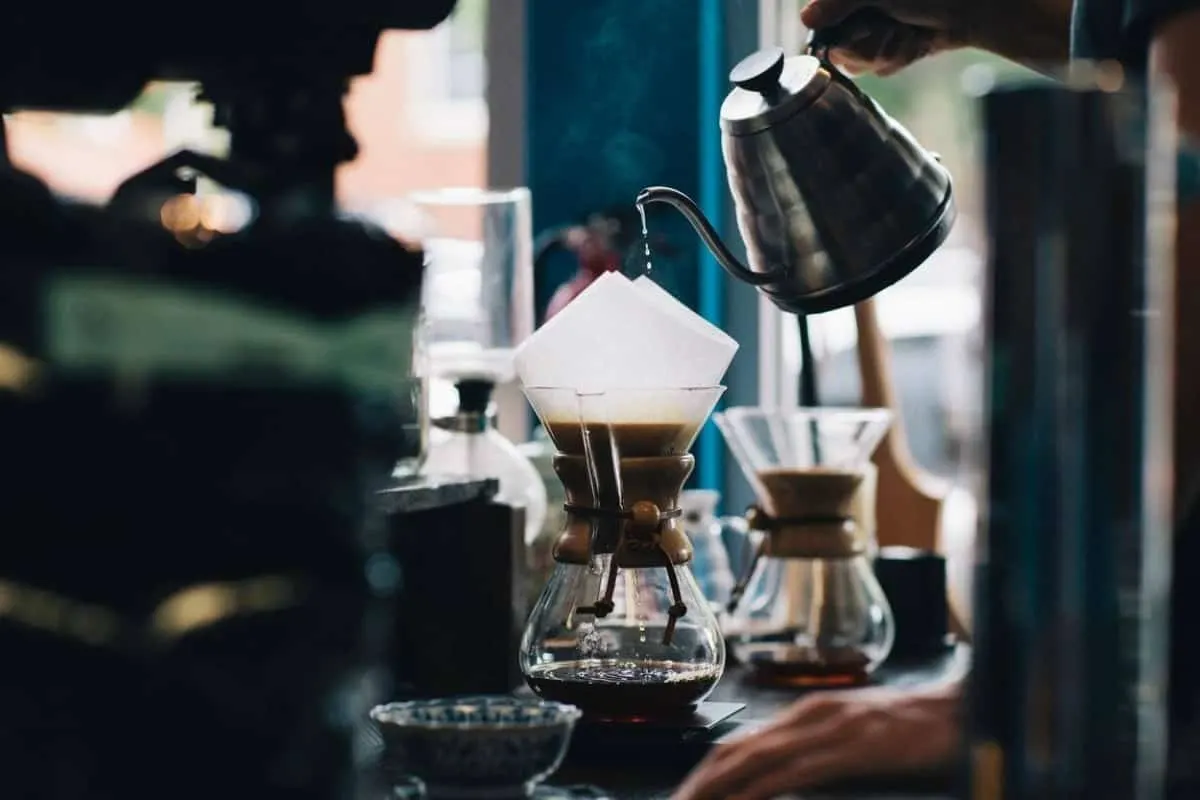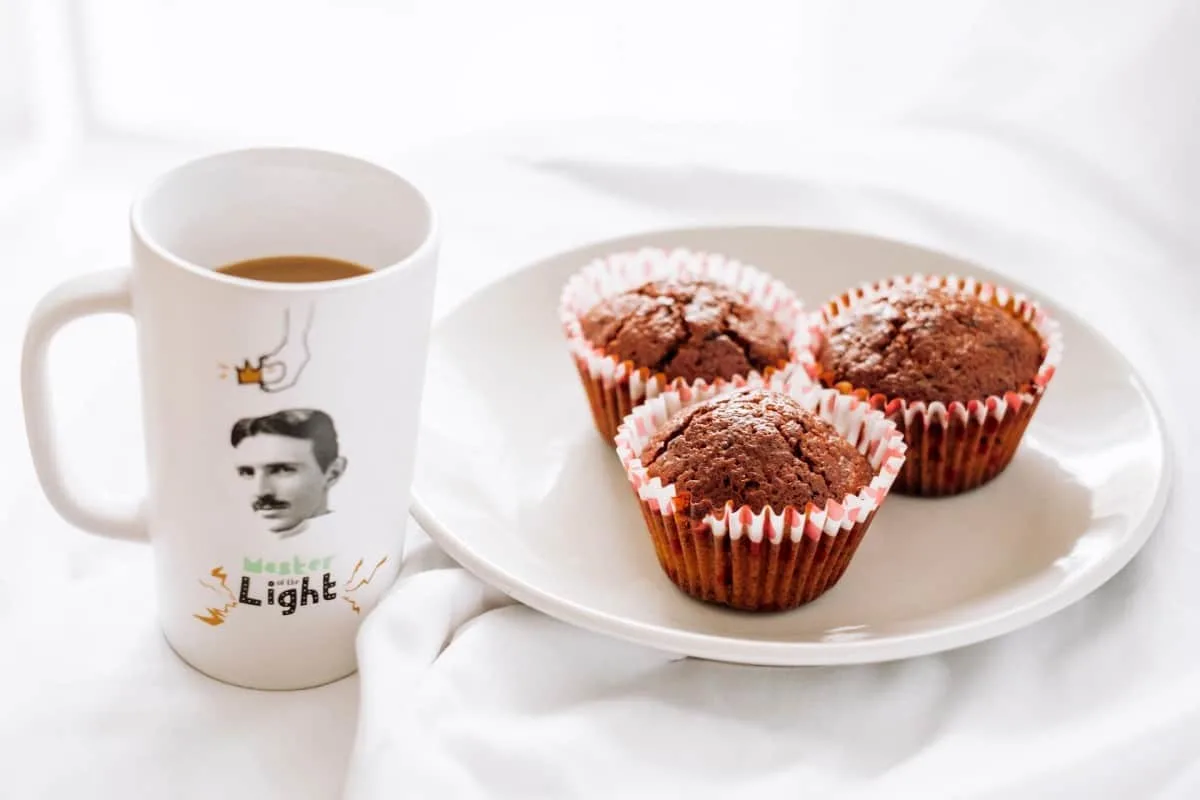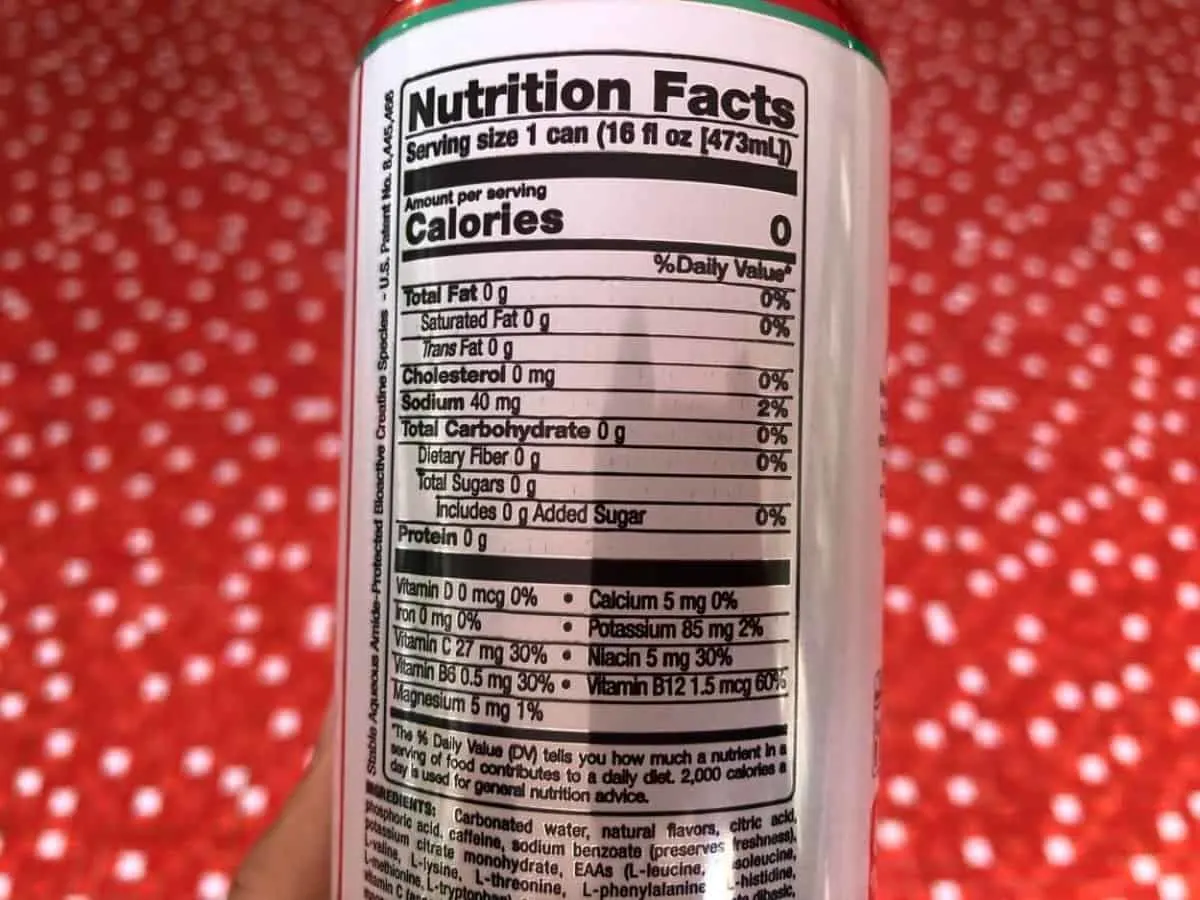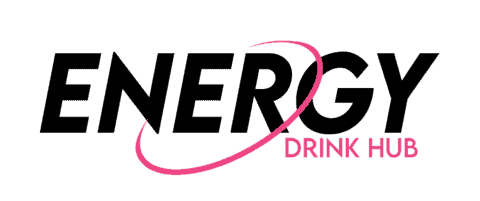
Bang Energy Drink contains 300 mg of caffeine, zero sugars, and zero calories while regular black coffee has two calories and a varying amount of caffeine.
Coffee is the beverage you think of when you’re faced with a long day.
In fact, a lot of people equate coffee with feeling productive. Known for its strong properties, it’s a staple in many diets across different types of consumers.
Coffee contains caffeine, a stimulant that fights off morning drowsiness and gears your body up for a long day.
Energy drinks promise to do the same with longer-lasting effects and added health benefits. But which of the two gives your body the most benefits?
In my opinion, if you want extra supplements to go with your drink, go for an energy drink, but if you’re looking for just an energy boost with a low risk of palpitation, choose coffee.
In this article, I’ll provide you with a comprehensive comparison between coffee and one popular energy drink brand, specifically Bang Energy Drink.
To learn more about the pros and cons of consuming coffee or energy drinks, keep reading.
Page Contents
Which is Healthier: Coffee or Energy Drink?
In terms of nutrients, both Bang Energy Drink and coffee contain many supplements that provide excellent health benefits.
According to the ingredients list of Bang Energy Drink, it has different amino acids, B-Vitamins, and supplements like creatine and CoQ10.
To briefly enumerate, here are the ingredients of Bang Energy Drink:
- Carbonated Water
- Citric Acid
- Natural Flavors
- Caffeine
- Sodium Benzoate (preserves freshness)
- Potassium Citrate Monohydrate
- EAAs (L-Leucine, L-Isoleucine, L-Valine, L-Lysine, L-Threonine, L-Phenylalanine, L-Histidine, L-Methionine, L-Tryptophan)
- Sucralose
- Potassium Phosphate Dibasic
- Vitamin C (ascorbic acid)
- Acesulfame Potassium
- Potassium Sorbate (preserves freshness)
- Magnesium Chloride
- Super Creatine (Creatyl-L-Leucine [Creatine Bonded to L-Leucine])
- Calcium Chloride
- Calcium Disodium EDTA
- Vitamin B3 (Niacinamide)
- CoQ10 (Coenzyme Q10)
- Vitamin B6 (Pyridoxine Hydrochloride)
- Vitamin B12 (Methylcobalamin)
On the other hand, like Bang, coffee is more than just a source of caffeine.
A single cup of coffee contains:
- Riboflavin (vitamin B2): 11% of the Reference Daily Intake (RDI)
- Pantothenic acid (vitamin B5): 6% of the RDI
- Manganese and potassium: 3% of the RDI
- Magnesium and niacin (vitamin B3): 2% of the RDI
To briefly expound here are the benefits of B-Vitamins:
| Types of B Vitamin | Name | Benefits |
| B1 | Thiamine | helps digest fats |
| B2 | Riboflavin | fights free radicals |
| B3 | Niacin | good for skin health |
| B5 | Pantothenic Acid | increases energy and strengthens the immune system |
| B6 | Pyridoxine | promotes healthy metabolism |
| B7 | Biotin | good for metabolism; promotes healthy skin, hair, and nails |
| B9 | Folate | good for the nervous system |
| B12 | Cobalamin | aids production of red blood cells and neurons |
If you’re looking for beverages that will enhance your overall performance and strengthen your endurance, I think Bang is more suitable for you.
Bang has creatine, which is an amino acid that enhances physical performance and cognitive function. It is also the main featured ingredient of Bang Energy Drink.
Naturally, creatine is synthesized by the body and is commonly found in the brain and muscles.
Organs such as the liver, kidneys, and pancreas generate creatine, but experts believe that additional creatine supplements enhance athletic performance and muscle development.
On top of this, creatine is also used to treat other health conditions, such as Parkinson’s disease and depression.
Bang also has CoQ10 or Coenzyme Q10, an antioxidant that protects the cells from damage and promotes metabolism.
The body must absorb this antioxidant every day because the amount of CoQ10 produced by the body diminishes as we age.
CoQ10 also provides the body with the following health benefits:
- improves heart health
- reduces muscle pain
- helps soothe migraine headaches
- protects against age-related diseases
At the end of the day, I think both are healthy beverages but you should also consider which is less risky for you to consume.
Bang contains 300 mg of caffeine which is considered very high given that the FDA recommends a daily limit of 400 mg for healthy adults.
Consuming more than this amount will likely lead to symptoms of caffeine overdose such as:
- dizziness
- diarrhea
- increased thirst
- insomnia
- headache
- fever
- irritability
In more complicated cases, symptoms could even worsen to :
- trouble breathing
- vomiting
- hallucinations
- confusion
- chest pain
- irregular or fast heartbeat
- uncontrollable muscle movements
- convulsion
Now, let’s move on to a comparison between coffee and Bang Energy Drink in terms of calories.
Bang vs Coffee: Difference in Calories

Bang is a zero-calorie energy drink, while the amount of calories in coffee depends on the type of coffee and the amount of sugar and creamer added.
For your reference, here is the amount of calories in different versions of coffee.
| Drinks | Calories (per 8 ounces) |
| Black Coffee | 2 |
| Iced Black Coffee | 2 |
| Espresso | 20 |
| Cold Press (nitro cold brew) | 2 |
| Brewed Coffee from flavored beans | 2 |
| Coffee with 1 tbsp (15ml) of french vanilla creamer | 32 |
| Coffee with 1 tbsp (15ml) of skim milk | 7 |
| Coffee with 1 tbsp (15ml) half and a tsp. of sugar | 38 |
| Nonfat Latte | 72 |
| Flavored Latte | 134 |
| Nonfat Cappuccino | 46 |
| Nonfat Macchiato | 52 |
| Nonfat Mocha | 129 |
| Nonfat Frozen Coffee Drink | 146 |
| Bulletproof Coffee with 2 cups (470 ml) of coffee, 2 tbsp. (28 grams) of butter and 1 tbsp (14 grams) of coconut oil | About 325 |
According to health experts, the general guide to losing weight is consuming 500 calories fewer than you usually consume.
Sticking to this diet will help you lose about 1 pound (0.45 kg) of body weight per week.
Bang vs Coffee: Difference in Nutrition Facts

Bang Energy Drinks have a nutrition facts label you can check on its packaging. On the other hand, the nutrients found in coffee usually vary depending on how you brew it and on other ingredients you add.
But for general reference, I included here the nutrients of one cup of black coffee. You can use this as a benchmark of the nutrients of other types of coffee you consume.
To help you compare Bang Energy Drink with coffee, I have listed down their nutrition facts below in the tabular form.
| Nutrition Facts | Black coffee (8 oz.) | Bang (16 fl. oz) |
| Caffeine | 96 | 300 mg |
| Calories | 2 | 0 |
| Total Fat | 0 g | 0 |
| Sodium | 5 mg | 40 mg |
| Total Carb | 0 g | 0 g |
| Sugars | 0 g | 0 g |
| Protein | 0 g | 0 g |
| Vitamin C | – | 50% of the daily recommended amount |
| Vitamin B6 | – | 25% of the daily recommended amount |
| Magnesium | – | 2% of the daily recommended amount |
| Niacin | – | 25 % of the daily recommended amount |
| Vitamin B12 | – | 25 % of the daily recommended amount |
| Vitamin B2 | – | 0 |
When you look at the nutritional information it seems that Bang Energy Drink is the better choice. However, don’t decide just yet.
According to general research and long-term studies about coffee consumption, coffee also gives you the following health benefits:
- improves energy levels
- improves brain performance
- helps burn fat
- improves physical performance
- contains essential nutrients
- protect from Alzheimer’s Disease and Dementia
- lowers risk of Parkinson’s Disease
- protects your liver
- fights depression
- lowers risk of stroke and heart disease
- prolongs life
Now, let’s move on to a comparison of caffeine content in coffee and Bang Energy Drink.
Bang vs Coffee: Difference in Caffeine
Both Bang and coffee contain caffeine but Bang has triple the caffeine level of a regular cup of coffee.
Caffeine is a stimulant commonly added in energy drinks because it has natural properties that fight fatigue and weariness in the body. It helps your body do more because it makes you feel energized and less tired.
Despite a rich formulation of vitamins and supplements, the high risk of caffeine toxicity in Bang Energy Drink cannot be downplayed.
Energy Drinks with 300 mg of caffeine such as Bang should remain strictly off-limits to children and teenagers, pregnant or lactating women, and other people with existing medical conditions.
According to a study, even just one energy drink increases the risk of heart problems among teenagers.
So if you’re really interested in consuming Bang, make sure your body is strong enough to handle its caffeine level.
Also, limit your consumption to just one can a day because any more is venturing into dangerous territory. You’re putting yourself at risk of damaging your nervous system.
The higher the amount of caffeine the higher the risk to experience unwanted side effects, which is why one cup of coffee is safer than one can of Bang Energy Drink.
However, safer doesn’t always mean more effective.
In my research, I’ve learned that there are some people who prefer Bang instead of coffee because they just don’t feel energized after drinking coffee.
These kinds of people probably have high caffeine tolerance and are used to consuming caffeinated drinks.
This is why low-level caffeinated beverages don’t seem to affect their performance anymore.
I suggest that when you see these comments online, exercise precaution and do not think it’s immediately applicable to you.
Keep in mind that different people have different caffeine tolerance. That is because caffeine metabolism depends on age, weight, and other health factors.
Here’s a video comparing coffee to some energy drink brands. Hear what they have to say.
Is Bang Energy Drink Bad For You?
Bang Energy Drink is not bad for your health if consumed in healthy intervals. However, its high amount of caffeine puts you at risk of experiencing caffeine overdose.
If consumed responsibly, Bang can make a difference in your performance.
Given that you are a healthy adult with no underlying medical conditions, Bang can help you lose weight when you consume it before or after workouts.
You will also feel alert and focused.
However, you should never consume Bang together with alcoholic beverages because this combination could be fatal.
Because of the caffeine, energy drinks mask the intoxicating effect of alcohol in the body. You’ll feel sober when the truth is you’ll already reach the threshold of your alcohol limit.
The result is you’ll drink more alcohol than your body can safely handle, which could lead to nervous breakdowns and heart problems.
How is Bang different from other energy drinks?
There are several things that make Bang Energy a different energy drink from other energy drinks. What makes it special is that it’s got “super creatine”, a type of caffeine that’s supposed to help build muscle and boost athletic performance.
But that’s not all – Bang also has a bunch of other stuff like amino acids, vitamins, and natural flavors that make it taste unique and might have some health benefits. Of course, it’s still important to drink Bang responsibly and not overdo it, as with any energy drink.
What Are the Side Effects of Drinking Bang Energy Drink?
Bang Energy Drinks have several side effects. While Bang energy drink can provide a quick boost of energy and mental focus, it also has potential side effects. One of the main concerns is the high levels of caffeine, which can cause jitters, anxiety, and difficulty sleeping.
Other side effects of drinking Bang energy drink may include headaches, nausea, increased heart rate, and dehydration. It’s important to read the label carefully and follow the recommended serving size, as excessive consumption can increase the risk of side effects.
How many cups of coffee is equivalent to a Bang?
A 16-ounce can of Bang energy drink is roughly equivalent to approximately three cups of brewed coffee in terms of caffeine content. The caffeine content of Bang energy drinks can vary depending on the flavor and size of the beverage. On average, a 16-ounce can of Bang contains approximately 300 milligrams of caffeine.
Moderation is key when consuming caffeinated beverages like Bang, and individuals should be mindful of their total daily caffeine intake from all sources to avoid potential negative side effects. f you have concerns about caffeine consumption or its effects on your health, it’s best to consult with a healthcare professional for personalized advice.
How many shots of espresso equal a Bang?
A 16-ounce can of Bang energy drink is roughly equivalent to approximately five shots of espresso in terms of caffeine content. On average, a 16-ounce can of Bang contains approximately 300 milligrams of caffeine. A standard shot of espresso typically contains around 63 milligrams of caffeine.
t. However, it’s important to note that espresso shots are typically consumed in smaller volumes compared to an entire 16-ounce can of Bang, which means the caffeine is consumed more concentrated in espresso shots.
Is Bang the Best Energy Drink?
Bang Energy Drink is arguably one of the best energy drinks because it is jam-packed with vitamins, supplements, and antioxidants. It is also calorie-free and sugar-free and the only disadvantage is the high risk of caffeine toxicity.
The high caffeine content is a double-edged sword. It does provide a more prolonged energy boost, but it is also risky if you’re sensitive to caffeine.
In deciding which is the best energy drink, I think it’s important that the beverage not only contains a lot of nutrients but is also safe from unwanted side effects.
Although Bang Energy Drink contains a lot of nutrients, it may not be the best energy drink for everyone because of its high caffeine content.
Is Drinking Bang Every Day Bad?
Drinking Bang Energy Drink is not bad as long as you strictly limit your consumption to one can a day.
Given that you have a healthy body and consume energy drinks sparingly, Bang would not be harmful to your health.
In fact, if you consume Bang with a goal to improve your physical performance and overall fitness then the result would be very productive.
Ultimately, it depends on how you consume Bang Energy Drink regularly.
Don’t buy Bang without first checking out my Bang buying guide to ensure you don’t pay too much and get the best deal possible.
Final Say
Both Bang Energy Drink and coffee have their own strengths and weaknesses as a beverage.
Bang has a lot of supplements but with a greater risk of adverse effects.
Meanwhile, coffee is safer but with an average amount of caffeine and therefore a shorter period of effectiveness.
If you’re not sensitive to caffeine, then I suggest going for Bang Energy Drink. It provides a lot more nutrients than plain coffee. However, this choice might not be ideal for everyone because Bang also has a higher risk of inducing caffeine overdose.
What’s best for you depends on your health and purpose in consuming a caffeinated beverage.
Remember to choose your beverage depending on your health and capacity!
